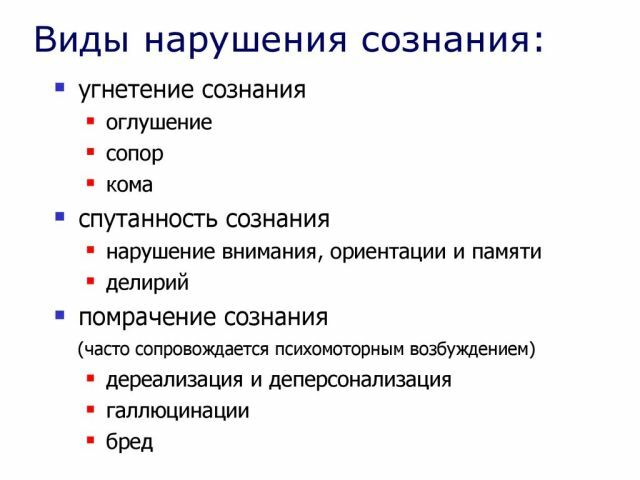 Epileptoid psychopathy( in the literature, you can also find the term "explosive", "excitable" psychopathy or psychosis) - one of the types of personality development disorder. This is not an independent disease, but a personality disorder.
Epileptoid psychopathy( in the literature, you can also find the term "explosive", "excitable" psychopathy or psychosis) - one of the types of personality development disorder. This is not an independent disease, but a personality disorder.
This disorder is manifested in excessive excitement, turning into a frenzied aggressiveness and irritability.
"Explosion" literally means an explosive volcanic eruption, accompanied by the emission of a large number of gases. Explosive psychopathy is so called that outbreaks of aggression in humans occur unexpectedly, but very violently.
Explosiveness is a tendency to unrestrained affective reactions with aggression and autoaggression."Epileptic" - because character such psychopaths somewhat resemble epileptics.
Pathogenesis and etiology of
disorder A clear cause of the disorder is not identified, but according to some theories, it can be caused by the following factors:
- Surrounding society .Most epileptoids grew in an environment where aggressive behavior combined with violence is considered
 norm. Children as they grow older acquire the same features as adults.
norm. Children as they grow older acquire the same features as adults. - Heredity .The etiology of epileptoid psychopathy may involve a factor of genetic predisposition, as a result of which the disease will be transmitted to children from the mother or father.
- Chemistry of the Brain .Serotonin( a pleasure hormone that prevents depression) functions in such patients, perhaps in a different way than in healthy people.
- Birth injuries and head injuries cause the development of epileptoid psychosis as a compensatory reaction.
- Infectious diseases of the central nervous system .
The epileptoid type of character accentuation can also develop due to the following reasons:
- Sexual or physical abuse .People who have experienced such humiliation have increased chances of developing this psychopathy.
- Other types of mental disorders .People who have any other antisocial disorders, including destructive behavior, are also at risk.
Epileptoid personality type - 9 facets of the
character Patients diagnosed with epileptic psychosis have the following characteristics that adversely affect the standard of living:
- Violation of relations with members of the society. Epileptoids are perceived by surrounding people, as always gloomy,
 aggressive, intolerant people. These are egocentric people who do not consider the opinions of others. They are despotic and very demanding of others. They can initiate verbal conflicts and apply physical influence. This leads to frequent shifts in work, low achievement in educational institutions, road accidents, problems with law enforcement agencies.
aggressive, intolerant people. These are egocentric people who do not consider the opinions of others. They are despotic and very demanding of others. They can initiate verbal conflicts and apply physical influence. This leads to frequent shifts in work, low achievement in educational institutions, road accidents, problems with law enforcement agencies. - Difficulty with mood control .Anxiety and depressiveness are always inherent in patients with this type of psychopathy. In movements, in thinking, there is a tendency to dysphoria.
- Problems with alcohol and drug use .They go hand in hand with explosive psychopathy. Epileptoids do not drink a little to raise their spirits, they feel the need to get drunk before losing their memory.
- Among the health problems of are diseases of the cardiovascular system, GIT, metabolism .
- Intentional self-healing of sometimes occurs in epileptoids in the most violent form of psychopathy, characterized by frequent outbreaks of aggression.
- Psychosis also affects the sexual relationship .During sexual intercourse, the epileptoid psychopath may adhere to sadism or masochism. Some of them choose homosexual or bisexual relationships.
- In the family it is always tyrants , forcing all members to obey them. Such a person acts as a despot who maintains his status in the family with the help of force. The fights and conflicts at home become commonplace. From the actions of epileptoid all his relatives and relatives are unhappy. He does not hesitate to punish children by physical methods.
- "HyperSocial" features of : pedantry, accuracy, adherence to traditions, exaggerated striving for justice.
- People of this type of personality often, but not always, look appropriately : chunky strong figure, massive neck and torso, large lower jaw, arms and legs of short dimensions.
Symptoms at different stages of growing up
The disease manifests itself in different ways - it all depends on age. If you know these nuances, you can prevent further progression of psychopathy. And the sooner you start the treatment, the better.
As you grow older, epileptic psychosis manifests as follows:
- Child is an epileptoid. A child with this disorder can cry for a very long time, even for several hours, and it is impossible to calm his
 .Such children in games want to be a tyrant dictating the rules. They like surreptitiously torment the younger ones and those who can not surrender them, mock the domestic animals. These are "difficult children", fighters who do not get along well in the children's collective.
.Such children in games want to be a tyrant dictating the rules. They like surreptitiously torment the younger ones and those who can not surrender them, mock the domestic animals. These are "difficult children", fighters who do not get along well in the children's collective.
In the elementary school of children with such psychopathy distinguish "hypersocial" traits: excessive accuracy when filling out the words and notebooks and taking care of their things. - Teenager is an epileptoid. The most strongly excitable psychopathy is manifested at the time of puberty. At this age for the sick teenagers are characterized by dysphoria - anger, apathy, gloomy look. The adolescents themselves are looking for an occasion to stir up a conflict. Even a slight restriction of freedom can lead to an attack of aggression. Such adolescents are characterized by gross abuse and cruelty, sometimes a tendency to injure themselves. Such adolescents often become pyromancers and dromo- men.
- Adult psychiatrist. By the time of growing up, psychopaths begin to show antisocial and illegal actions, alcohol abuse or debauchery is practiced. Some patients by the age of 30 can eventually learn to control their outbursts of anger - then they interact with the society without problems. Most are imprisoned in prisons, where they play the role of informal, negative leaders.
Diagnosis and care of
Diagnosis is complex, so a true disease can only be determined after other mental pathologies associated with aggressive seizures have been ruled out: personality disorder, psychotic disorder, manic episode, ADHD.
 Epileptic psychoses are also similar to outbursts of rage due to the use of drugs or medications. Head trauma is another cause of sudden aggressive attacks, which can complicate the diagnosis of epileptoid psychopathy.
Epileptic psychoses are also similar to outbursts of rage due to the use of drugs or medications. Head trauma is another cause of sudden aggressive attacks, which can complicate the diagnosis of epileptoid psychopathy.
The patient describes the outbreak of aggression as a "psychic attack", when at first you are very tense or agitated, and immediately after the attack you feel relief. After an attack the patient can feel remorse, regret or embarrassment because of his behavior.
If there is a suspicion of epileptoid psychopathy, a consultation with a specialist in the treatment of mental disorders is necessary. To determine the correct diagnosis, examination and psychological evaluation are usually used.
First and foremost, the psychiatrist needs to turn over the past of the patient, which can serve as a decisive factor for the development of explosive psychopathy. It is necessary to find out the presence of stressful events and complex situations that occurred with the patient in childhood or relatively recently.
Some questions that the doctor must ask to establish the correct diagnosis:
- How often do you experience outbreaks of aggression? Why is this happening?
- Have there been cases of damage to tangible property during an attack?
- Have you ever attempted suicide?
- Remember the times when seizures negatively affected relationships in the family or with colleagues at work?
- What will help you calm down during such an attack?
- Did any of your relatives have mental illnesses?
- Have you ever had a head injury?
There is no specific treatment for explosive psychosis. The main therapy to stop the development of pathology includes  visits to psychotherapeutic activities and taking medications.
visits to psychotherapeutic activities and taking medications.
Therapy can be as individual, as well as family and group. The goal of family psychotherapy is to relieve tension between family members, to seek compromises. Psychotherapy in groups solves other problems - correction of undesirable behavior, ways to control anger, training in relaxation.
Rehabilitation also includes rational employment. The lack of work contributes to the progression of the disease. Setting up a clear regime and discipline allows you to keep psychopathy under control.
Different groups of medicines that can be prescribed by a physician:
- antidepressants, including selective serotonin reuptake inhibitors( SSRIs);
- normotry;
- antipsychotics;
- sedative medication.
In explosive psychopathy, the chance of recovery depends on the severity and stage of the disease, as well as the socium in which the patient is.
With prolonged and ongoing breakdowns, the social outlook is unfavorable: alcohol and drug use, problems with the law lead to personal degradation. If the seizures are short in duration and are caused by mental trauma, then the prognosis is favorable - in time there is the possibility to achieve depsychopathy.



